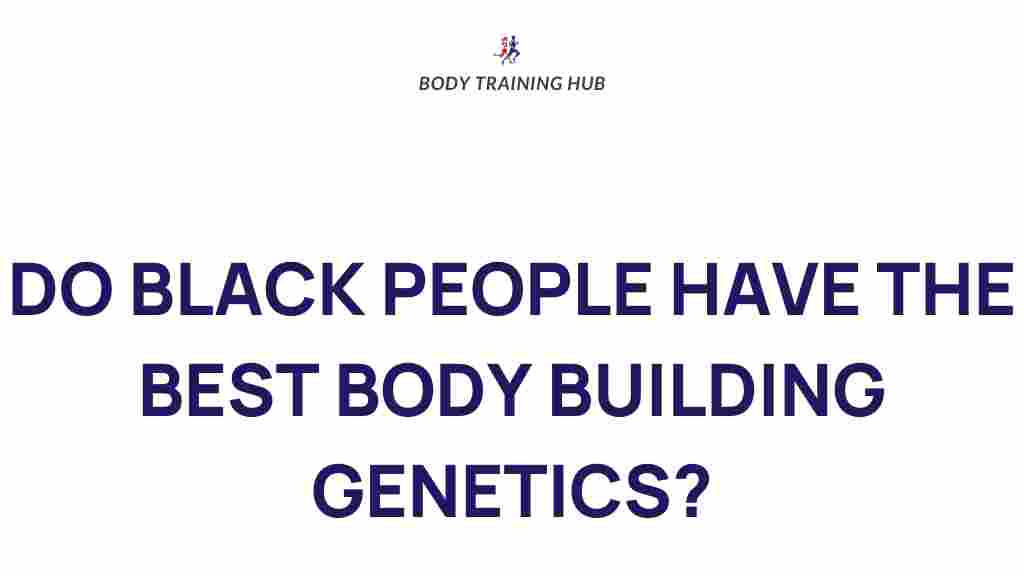Unraveling the Genetic Secrets of Bodybuilding: Do Black People Have an Advantage?
Bodybuilding is a sport that demands dedication, rigorous training, and a deep understanding of the factors that contribute to muscle growth and overall performance. Among these factors, genetics plays a pivotal role. As we delve deeper into the world of bodybuilding, we often encounter questions regarding the influence of ethnicity on athletic performance. One prominent discussion revolves around whether individuals of different ethnic backgrounds, particularly Black athletes, possess genetic advantages that enhance their bodybuilding potential. This article aims to explore the intricate relationship between genetics, ethnicity, and bodybuilding, and how these elements contribute to the diverse landscape of strength and physique.
Understanding Genetics in Bodybuilding
Genetics refers to the biological factors that influence an individual’s physical characteristics and capabilities. In bodybuilding, genetics can dictate various aspects, including:
- Muscle Fiber Composition: Individuals possess different ratios of fast-twitch and slow-twitch muscle fibers. Fast-twitch fibers are crucial for explosive strength and hypertrophy, while slow-twitch fibers are essential for endurance.
- Hormonal Levels: Testosterone and growth hormone levels significantly impact muscle growth, recovery, and overall performance.
- Body Fat Distribution: Genetics influences where the body stores fat, which can affect physique aesthetics.
- Metabolism: An individual’s metabolic rate can determine how efficiently they can build muscle and lose fat.
The Role of Ethnicity in Athletic Performance
Athletic performance has been studied extensively in relation to ethnicity. Some studies suggest that certain ethnic groups may exhibit characteristics that predispose them to excel in specific sports, including bodybuilding. For example:
- Muscle Mass: Research indicates that Black individuals often have a higher proportion of fast-twitch muscle fibers, which can contribute to greater strength and muscle mass.
- Bone Density: Ethnic differences in bone density may affect strength and injury resistance.
- Recovery Rates: Some evidence suggests variations in recovery rates among different ethnic groups, potentially influencing training regimens and performance.
However, it is important to acknowledge that these findings do not imply that one ethnicity is superior to another; rather, they highlight the diversity found within human genetics. Each individual’s unique genetic makeup plays a significant role in their potential for success in bodybuilding.
How Genetics Influences Muscle Growth
Muscle growth, or hypertrophy, is a complex process influenced by various factors, including training, nutrition, and genetics. Here’s how genetics can specifically impact muscle growth:
- Response to Training: Some individuals may experience more significant gains in muscle size and strength from similar training programs due to their genetic predisposition.
- Recovery Ability: Genetic factors can dictate how quickly an athlete can recover from intense workouts, which is essential for continuous muscle growth.
- Potential for Injury: Certain genetic traits may make individuals more prone to injuries, affecting their training consistency and progress.
The Impact of Diversity on Bodybuilding
Diversity in bodybuilding is not just about ethnicity; it encompasses a wide range of factors including body types, training styles, and nutritional approaches. Embracing diversity can be beneficial in several ways:
- Varied Training Methods: Different ethnic backgrounds may bring unique training philosophies that can enhance overall performance.
- Nutrition Practices: Cultural dietary practices can influence nutritional strategies, impacting muscle growth and recovery.
- Psychological Factors: Diverse backgrounds can lead to varied mental approaches to training and competition, which can be advantageous.
Training Strategies for Maximizing Genetic Potential
Understanding your genetic predispositions can help in creating a more tailored training program that maximizes your bodybuilding potential. Here’s a step-by-step process:
Step 1: Identify Your Body Type
Recognize whether you are an ectomorph (lean), mesomorph (muscular), or endomorph (larger frame) to tailor your training and nutrition accordingly.
Step 2: Assess Muscle Fiber Composition
While it’s challenging to determine your muscle fiber composition without tests, you can analyze your performance in various training styles. If you excel in explosive movements, you may have a higher percentage of fast-twitch fibers.
Step 3: Develop a Personalized Training Program
Focus on a mix of strength training, hypertrophy-specific training, and conditioning. Incorporate compound movements such as squats, deadlifts, and bench presses, along with isolation exercises.
Step 4: Monitor Your Progress
Keep a detailed log of your workouts, nutrition, and recovery to understand what works best for your body. Adjust your program based on your progress and how your body responds.
Step 5: Prioritize Recovery
Incorporate rest days, proper nutrition, and possibly supplements to aid recovery. Understanding your body’s recovery needs is crucial for optimal muscle growth.
Troubleshooting Common Training Challenges
Even with a tailored approach, bodybuilders may encounter challenges. Here are some common issues and tips to troubleshoot them:
- Plateaus: If you’re not seeing progress, consider changing your training routine or increasing your caloric intake.
- Injuries: Listen to your body. If you experience pain, consult a professional and adjust your training to avoid further injury.
- Lack of Motivation: Surround yourself with supportive individuals or join a bodybuilding community. Setting short-term goals can reignite your passion.
Conclusion
In conclusion, the relationship between genetics, ethnicity, and bodybuilding is complex and multifaceted. While certain genetic traits may provide advantages for muscle growth and athletic performance, it is essential to recognize that success in bodybuilding is not solely determined by genetics. Factors such as training, nutrition, and mental resilience play significant roles in shaping an athlete’s physique and performance.
As we celebrate the diversity within the bodybuilding community, it is crucial to approach the topic of genetics with nuance and respect. Each individual has the potential to achieve greatness, regardless of their ethnic background. By understanding and embracing the genetic differences that make us unique, we can foster an inclusive environment that encourages all athletes to reach their full potential in the world of bodybuilding.
For more information on training strategies and nutrition for optimal performance, check out our comprehensive guide. Additionally, for the latest research on genetics and athletics, visit PubMed.
This article is in the category Strength & Recovery and created by BodyTraining Team
